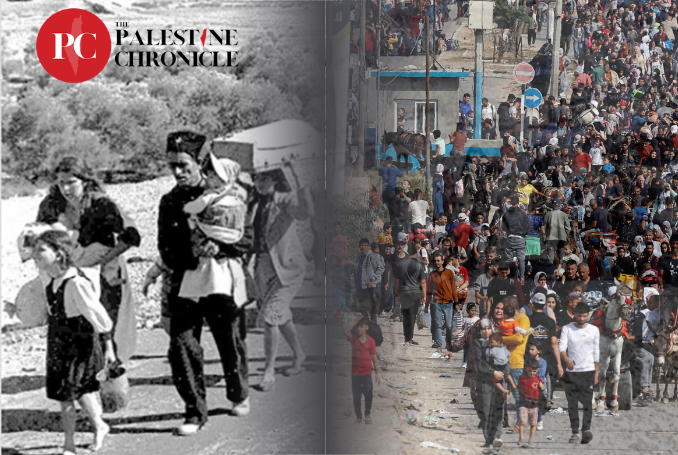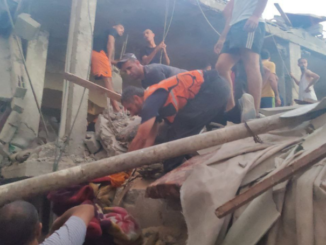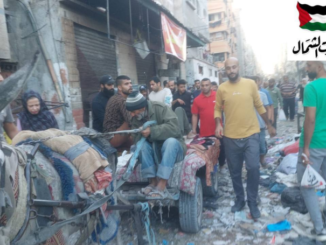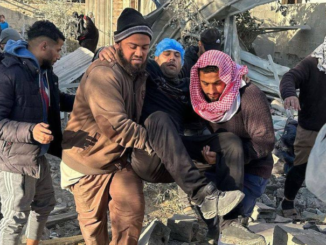
By Ramzy Baroud 
The ‘Gaza Nakba’ must be rejected, not just by words, but through solid Arab and international action, to prevent Israel from taking advantage of the war to expel Palestinians out of their homeland, again.
It is simply inaccurate to claim that the ongoing Israeli attempt to displace all, or many Palestinian refugees from Gaza to Sinai is a new idea, compelled by recent circumstances.
Displacing Palestinians, or as it is known in Israeli political lexicon, the ‘transfer’, is an old idea – as old as Israel itself.
In fact, historically, population ‘transfer’ has been more than an idea, but an actual government policy, with clear mechanisms. Yosef Weitz, director of the Land and Afforestation Department, was entrusted with setting up the Transfer Committee in May 1948 to oversee the expulsion of Palestinian Arabs from their towns and villages.
In other words, while Israel was concluding the initial phase of ethnic cleansing, it initiated another phase, that of ‘transfer’, the results of which are well-known.
But even many of Israel’s so-called liberal intellectuals have, and continue to promote the idea, either proactively or in hindsight. “I don’t think that the expulsions of 1948 were war crimes,” Israeli historian Benny Morris said in an interview with Haaretz in 2004. “I think he (Israel’s founding father David Ben-Gurion) made a serious historical mistake in 1948 (…) If he was already engaged in expulsion, maybe he should have done a complete job. (… ) You can’t make an omelet without breaking eggs. You have to dirty your hands.”
Morris was specifically referring to the Nakba, which began in earnest in December 1947, and did not conclude until 1949. Then, ethnic cleansing took on a different form, a slower campaign aimed at rejigging the demographic map of the newly founded Israel in favor of Israeli Jews at the expense of Palestinian Arabs.
Several campaigns targeting Palestinian Arab communities, which remained in Israel after the Nakba, were initiated under various guises. Though not a single community had survived the demographic onslaught by the Israeli government, Palestinian Bedouins received the lion’s share of displacement – a campaign that continues to this day.
After the war of June 1967, mass expulsion resumed once more. Approximately 430,000 Palestinians were forcibly displaced, especially from areas originally occupied in 1948. Over the years, up to the present, hundreds of thousands of Israeli Jewish settlers have taken the place of the displaced Palestinians, claiming their land, homes and orchards as if their own.
In fact, the slow ethnic cleansing of the West Bank is considered the epicenter of Israel’s ongoing colonialism in Occupied Palestine. And, from an international law perspective, it is one of its greatest war crimes, as it represents a stark violation of international norms, especially the Fourth Geneva Convention.
“The Occupying Power shall not deport or transfer parts of its own civilian population into the territory it occupies,” Article 49 of the Fourth Geneva Convention states. It also prohibits the “individual or mass forcible transfers, as well as deportations of protected persons from occupied territory.”
To claim that the recent call for mass expulsion of Palestinians from Gaza is a new event, compelled by the violent episode of October 7, and the subsequent genocide in Gaza, is both inaccurate and dishonest.
This claim ignores the fact that Israel, as a settler-colonial project, was founded on the concept of ethnic cleansing, and that Israeli politicians never stopped talking about mass displacing Palestinians, even under supposedly ‘normal’ circumstances.
For example, in 2014, then Foreign Minister Avigdor Lieberman tried to rebrand the old ‘transfer’ strategy, using not-so-clever new language.
“When I talk about land and population exchange, I mean the Little Triangle and Wadi Ara,” Lieberman said in a statement, referring to the predominantly Arab regions in central and northern Israel, insisting that “this is not a transfer”.
This context is critical if we wish to truly understand the story behind the enthusiastic return to the language of ethnic cleansing.
On November 11, Avi Dichter, Israel’s Minister for Agriculture and former head of the spy agency Shin Bet, specifically called for another Nakba. “We are now rolling out the Gaza Nakba,” Dichter said in a TV interview.
We can easily extract the following set of information from the Israeli minister’s statement: Israelis are very familiar with the term ‘Nakba’, thus what has befallen the Palestinian people 75 years ago – that of ethnic cleansing and genocide – and they remain unrepentant.
However, this was not a statement said in anger. A leaked government report dated October 13, six days into the war, suggested the mass transfer of Gaza’s population to the Sinai desert.
Four days later, on October 17, the Israeli think tank ‘Misgav Institute for National Security & Zionist Strategy’, published a paper calling on the Israeli government to take advantage of this “unique and rare opportunity to evacuate the whole Gaza Strip”.
It makes little sense to assume that such extensive reports were all conjured up within a matter of days. Indeed, it takes years of planning and discussions for such complex schemes to be prepared, so that they become worthy of official consideration.
This is not the only evidence that the displacement of Palestinians in Gaza was not an urgent strategy propelled by recent events, as Palestinians in the West Bank, who were not involved in the October 7 operation, also found themselves under the threat of expulsion. This prompted Jordanian Prime Minister Bisher Khasawneh to state on November 7 that Amman considers any attempt to displace Palestinians a “red line”, in fact, a “declaration of war”.
Though Arab and international pressure has, thus far, failed to slow down the Israeli death machine in Gaza, Arab countries spoke firmly against any Israeli attempts to displace Palestinians.
For now, the majority of Gaza’s 2.3 million inhabitants, most of whom are refugees from historic Palestine, are internally displaced within that tiny piece of land, denied water, food, electricity – in fact, life itself. But they remain steadfast and will not allow for another Nakba to take place, no matter the cost.
The ‘Gaza Nakba’ must be rejected, not just by words, but through solid Arab and international action, to prevent Israel from taking advantage of the war to expel Palestinians out of their homeland, again. They must also work to hold Israel accountable for its war crimes, past and present, starting with the original Nakba of 1948.

– Ramzy Baroud is a journalist and the Editor of The Palestine Chronicle. He is the author of six books. His latest book, co-edited with Ilan Pappé, is “Our Vision for Liberation: Engaged Palestinian Leaders and Intellectuals Speak out”. Dr. Baroud is a Non-resident Senior Research Fellow at the Center for Islam and Global Affairs (CIGA). His website is www.ramzybaroud.net








Why play Israel’s game and talk about Israeli Jews as if Jews were a people. You should talk about Israeli Jews and Palestinian Christians and Muslims, not Palestinian Arabs.
Or you talk about Israeli Europeans and Palestinian Arabs, where Arab and European are cultures.
Please stop calling it ISRAEL. It is not.
It is a portion o Palestine STIOLEN and now OCCUPIED by FAKE JEWS.They are from teh TRIBE of Khazarian and converted to what they cal themelves Ashkkanzi ZIONISTS and havee ABSOLUTEL NO NATURAL RIGHT to even BE in the Middle East
Dont believe me?
Ask anyone of them, including NETANYAHU , for CERTIFIED Lawful DOCUMENTS proving their ancestors came ORIGINALLY from ANYWHERE in the Middle East, much less Palestine. Netanyahu, a SEMITIC name, is NOT his Birth name.He has a Khazarian FAMILY Polish last name and changed it to NETANYAHU to appear Semitic